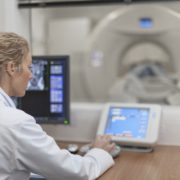Do You Really Need an MRI for That?
Possibly the number one question I get from clients on a daily basis is…
“Should I get an MRI for that?”
Hey… I get it… you’ve got pain that won’t go away and you want to see what’s going on inside… why not?
Not so fast!
What if I told you that getting an MRI too soon (or when you don’t even need one) can actually lead you to getting unnecessary procedures, or even surgery!
Don’t get me wrong…
MRI’s are an amazing advancement in medical technology that have saved many lives. And if you’ve had trauma – like a major fall or accident – or you’re exhibiting symptoms that we call “red flags” (progressive/serious neurological deficits, bowel and bladder issues, unrelenting/unexplainable pain) – then you want to get an MRI. But when it comes to musculoskeletal pain (back, neck, knee, hip, shoulder, etc) – again – unless you’ve had a major fall or trauma – you typically DO NOT need an MRI.
Let me explain…
When it comes to musculoskeletal pain – 80% of the time it’s what we call “mechanical” in nature. That means it’s due to the way you are (or aren’t) moving. For example, let’s say you’re suffering from low back pain and terrible sciatica. Most people in this situation want to get an MRI. And it will reveal anything from a bulging disc, to stenosis, to arthritis, to degenerative discs. Whichever one of these “ailments” shows up on your MRI will typically get blamed as the source of your problem. From there – you’ll typically be prescribed some type of procedure (or surgery) to “fix” said ailment.
Sound familiar?
Well… here’s the thing… research has shown over and over that these so-called ailments appear in the MRI’s of just about everyone over the age of 50. In a 2015 study by Brinkjiki et al – they did MRI’s on over 3000 people who had NO back pain. And you know what they found? For people in their 60’s – they found that 70% of them had disc bulges – 88% had disc degeneration – and 50% had facet degeneration (something you often see with arthritis). And as the age groups increased – so did these ailments!
The meaning of this and other studies like it is profound…
It means that you absolutely can NOT rely on your MRI to diagnose your problem.
It also means that many people are getting procedures on these normally occurring structural ailments when it’s not even the root cause of the problem.
So what IS the root cause of the problem?
Typically – it’s “mechanical” – meaning your problem has to do with the way you move, bad postural habits learned over the years, muscular and joint imbalances, or “wear and tear” issues. It’s also why we tend to see more mechanical problems show up in people once they hit age 40 and beyond – because these problems take awhile to manifest.
Although the pain you experience may be coming from one of those ailments we spoke about earlier (for example – a bulging disc irritating your nerve route – a meniscus tear irritating your knee when it moves) – the root cause is how your movement habits are irritating the structure. When you fix the movement problem – the structural issue becomes irrelevant – at least 80% of the time.
If you’re confused – I don’t blame you.
Most medical doctors are not trained in what mechanical pain truly is or what it means. They are trained to diagnose problems using images such as Xrays and MRIs. Nothing wrong with that of course – but it can become a problem when you do an MRI too soon – without first ruling out if your pain is due to a mechanical cause.
If you’re currently suffering from back, neck, hip, knee, shoulder, ankle pain, etc… and you’ve been told you need an MRI to “figure out what’s going on” – hold that thought!
Why don’t you first consult with a mechanical pain specialist. There’s an 80% chance your problem will fall into this category. And you can save yourself from unnecessary treatments that might not work.
You can talk to one of our mechanical pain specialists for free by clicking HERE. It’s a completely free, no-obligation appointment that will give you all the information you need to make the best decision for YOUR health – whether that’s working with us or not!
Dr. Carrie Jose is a Physical Therapy Specialist and Mechanical Pain Expert, and owner of CJ Physical Therapy & Pilates in Portsmouth, NH. To get in touch – or inquire about getting help – CLICK HERE or call 603-380-7902


